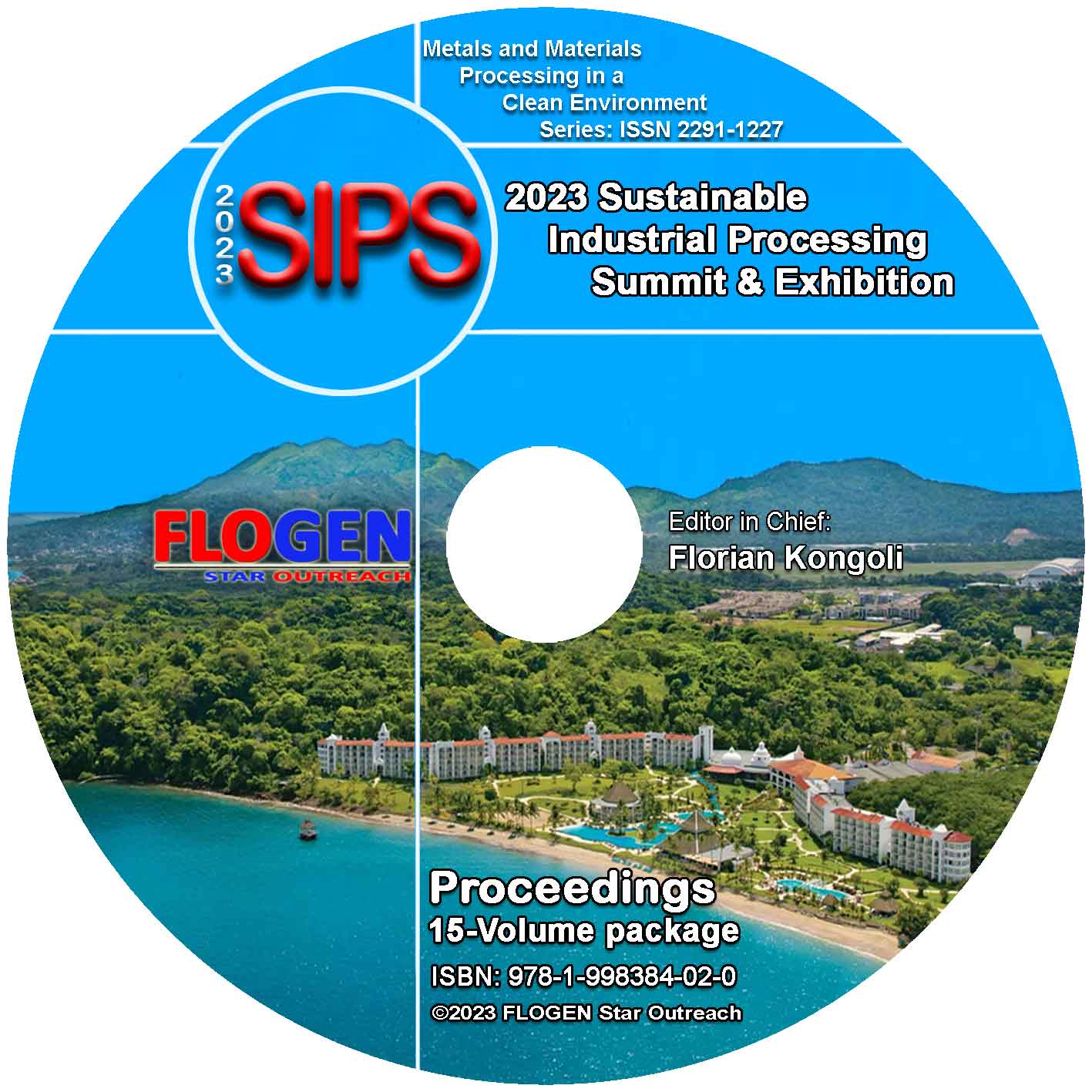2023-Sustainable Industrial Processing Summit
SIPS2023 Volume 13. Intl. Symp on Physics, Mathematics and Multiscale Mechanics
| Editors: | F. Kongoli, A. B. Bhattacharya, A.C. Pandey, G. Sandhu, F. Quattrocchi, L. Sajo-Bohus, S. Singh, H.S. Virk, R.M. Santilli, M. Mikalajunas, E. Aifantis, T. Vougiouklis, P. Mandell, E. Suhir, D. Bammann, J. Baumgardner, M. Horstemeyer, N. Morgan, R. Prabhu, A. Rajendran |
| Publisher: | Flogen Star OUTREACH |
| Publication date: | 21 December 2023 |
| Pages: | 298 pages |
| ISBN: | 978-1-989820-96-4 (CD) |
| ISSN: | 2291-1227 (Metals and Materials Processing in a Clean Environment Series) |

CD shopping page
AN INTRODUCTION TO IRREVERSIBLE LIE-ADMISSIBLE MATHEMATICS FOR CONTROLLED NUCLEAR FUSIONS
Ruggero Maria Santilli1;1HADRONIC TECHNOLOGIES CORPORATION, Palm Harbor, United States;
Type of Paper: Regular
Id Paper: 265
Topic: 38
Abstract:
Studies in the axiomatic formulation of the irreversibility of nuclear fusions with the most general possible SA and NSA forces were initiated in the 1967 Ph. D. Thesis [1] [2] via the generalization of Lie algebras into Albert’s Lie-admissible and Jordan-admissible algebras [3] and the formulation of the first known deformations of Lie algebras with product (Eq. (8) of [1])
which, twenty years later, were followed by tens of thousands of papers on q-deformations. In 1978, after joining the Department of Mathematics of Harvard University under DOE support, Santilli achieved [4] the axiomatic formulation of irreversibility via bi-modules in which motions forward (backward) in time are represented with the ordering of all products to the right (ordering of all products to the left)
The Lie-admissible branch of hadronic mechanics [5] [6] (see also [7]-[17]) is then characterized by two inequivalent iso-mathematics, one per each direction of time, resulting in the Lie-admissible generalization of Heisenberg’s equation for an observable Q in the infinitesimal and finite forms in which SA interactions are represented by the Hamiltonian H and forward NSA interactions are represented by the Santillian S [1] [2]
where e> (e<) is the exponentiation in the forward (backward) iso-envelope, with particular case for R = 1 − F/H, S = 1
We then have the time rate of increase of the energy expected for nuclear fusions, showing that Lagrange’s and Hamilton’s external terms F are represented by the Jordan algebra content of the Lie-admissible algebra. Note that given quantum mechanical models of nuclear fusions can be completed into hadronic models via four different simple non-unitary transformations
, with a consistent representation of irreversibility, the extended share of nuclear constituents and their broadest possible SA and NSA interactions. Applications to sustainable and controlled nuclear fusions are presented in Refs. [18] [19]. Tutoring lecture [20] are recommendable for physicists.
Keywords:
Hadronic Chemistry; Hadronic Mechanics; Mathematics; Santilli Iso- Geno- Hyper- And Isodual-NumbersReferences:
[1] R. M. Santilli, â€Embedding of Lie-algebras into Lie-admissible algebras,†Nuovo Cimento 51, 570-585 (1967), www.santilli-foundation.org/docs/Santilli-54.pdf[2] R. M. Santilli, â€Dissipativity and Lie-admissible algebras,†Meccanica 1, 3-12 (1969).
[3] A. A. Albert, Trans. Amer. Math. Soc. 64, 552-585 (1948).
[4] R. M. Santilli, â€Initiation of the representation theory of Lie-admissible algebras of operators on bimodular Hilbert spaces,†Hadronic J. 3, 440-467 (1979), http://www.santilli-foundation.org/docs/santilli-1978-paper.pdf
[5] R. M. Santilli, Lie-Admissible Approach to the Hadronic Structure, International Academic Press, Vols. I and II (1978), http://www.santilli-foundation.org/docs/santilli-71.pdf, http://www.santilli-foundation.org/docs/santilli-72.pdf
[6] R. M. Santilli, Elements of Hadronic Mechanics, Volumes I, II, III, Ukraine Academy of Sciences (1995), http://www.i-b-r.org/Elements-Hadronic-Mechanics.htm
[7] H. C. Myung and R. M. Santilli, Editors, Proceedings of the Second Workshop on Lie-Admissible formulations, Parts A and B: http://www.santilli-foundation.org/docs/hj-2-6-1979.pdf, http://www.santilli-foundation.org/docs/hj-3-1-1979.pdf
[8] H. C. Myung and R. M. Santilli, Editors, Proceedings of the Third Workshop on Lie-Admissible Formulations, Parts A, B, C: http://www.santilli-foundation.org/docs/hj-4-2-1981.pdf, http://www.santilli-foundation.org/docs/hj-4-3-1981.pdf, http://www.santilli-foundation.org/docs/hj-4-4-1981.pdf
[9] T. Arenas, J. Fronteau and R. M. Santilli, Editors, Proceedings of the First International Conference on Nonpotential Interactions and their Lie-Admissible Treatment, Part A, B, C, D: http://www.santilli-foundation.org/docs/hj-5-2-1982.pdf, http://www.santilli-foundation.org/docs/hj-5-3-1982.pdf, http://www.santilli-foundation.org/docs/hj-8-4-1982.pdf, http://www.santilli-foundation.org/docs/hj-5-5-1982.pdf
[10] H. C. Myung and R. M. Santilli, Editors, Proceedings of the First and Second Workshops on Hadronic Mechanics, http://www.santilli-foundation.org/docs/hj-6-6-1983.pdf, http://www.santilli-foundation.org/docs/hj-7-5-1984.pdf, http://www.santilli-foundation.org/docs/hj-7-6-1984.pdf
[11] Tuladhar Bhadra Man, Editor, Proceedings of the third international conference on the Lie-admissible treatment of non-potential interactions, Kathmandu University, Nepal (2011), Vol. I and II: 2 http://www.santilli-foundation.org/docs/2011-nepal-conference-vol-1.pdf, http://www.santilli-foundation.org/docs/2011-nepal-conference-vol-2.pdf
[12] A. Schoeber, Editor, Irreversibility and Non-potentiality in Statistical Mechanics, Hadronic Press (1984), http://www.santilli-foundation.org/docs/Santilli-110.pdf
[13] S. Beghella-Bartoli and R. M. Santilli, Editors, Proceedings of the 2020 teleconference on the Einstein-Podolsky-Rosen argument that ’Quantum mechanics is not a complete theory,†Curran Associates, New York, NY (2021), www.proceedings.com/59404.html
[14] J. Fronteau, A. Tellez-Arenas and R. M. Santilli, â€Lie-admissible structure of statistical mechanics,†Hadronic Journal 3, 130-176 (1979), http://www.santilli-foundation.org/docs/arenas-fronteau-santilli-1981.pdf
[15] J. Dunning-Davies, J. Dunning-Davies, â€The Thermodynamics Associated with Santilli’s Hadronic Mechanics,†Progress in Physics 4, 24-26 (2006), http://www.santilli-foundation.org/docs/Dunning-Davies-Thermod.PDF
[16] A. A. Bhalekar, â€Santilli’s Lie-Admissible Mechanics. The Only Option Commensurate with Irreversibility and Nonequilibrium Thermodynamics,†AIP Conf. Proc.
1558, 702-722 (2013), http://www.santilli-foundation.org/docs/bhalekar-lie-admissible.pdf
[17] T. Vougiouklis, â€The Santilli theory ’invasion’ in hyperstructures,†Algebras, Groups and Geometries 28, 83-104 (2011), http://www.santilli-foundation.org/docs/santilli-invasion.pdf
[18] R. M. Santilli, â€Lie-admissible invariant representation of irreversibility for matter and antimatter at the classical and operator levels,†Nuovo Cimento B 121, 443-485 (2006), http://www.santilli-foundation.org/docs//Lie-admiss-NCB-I.pdf
[19] R. M. Santilli, â€Apparent Resolution of the Coulomb Barrier for Nuclear Fusions Via the Irreversible Lie-admissible Branch of Hadronic Mechanics,†Progress in Physics, 18, 138-163 (2022), www.ptep-online.com/2022/PP-64-09.PDF
[20] R. M. Santilli, â€Tutoring on Lie-admissible mathematics,†Parts I, II, III: http://www.world-lecture-series.org/santilli-tutoring-iv-part-1, http://www.world-lecture-series.org/santilli-tutoring-iv-part-2, http://www.world-lecture-series.org/santilli-tutoring-iv-part-3